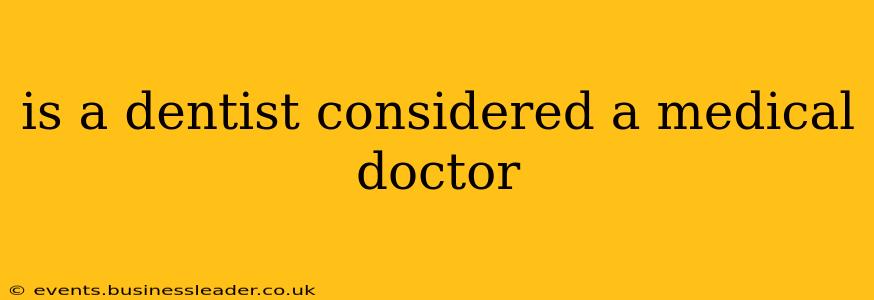Is a Dentist Considered a Medical Doctor?
The short answer is no, a dentist is not considered a medical doctor. While both dentists and medical doctors are healthcare professionals requiring extensive education and training, their areas of expertise and scope of practice are distinct. This difference is reflected in their educational paths and licensing.
This seemingly simple question often sparks confusion, so let's delve deeper into the key differences:
What is the difference between a dentist and a medical doctor?
The fundamental difference lies in their focus: medical doctors (MDs) or doctors of osteopathic medicine (DOs) treat the overall health of the body, diagnosing and treating a wide range of illnesses and injuries. Dentists, on the other hand, specialize in the oral cavity, focusing on the teeth, gums, and related structures. Their expertise lies in preventing, diagnosing, and treating oral diseases and conditions.
What kind of education and training do dentists receive?
To become a dentist, individuals must complete a rigorous course of study. This typically includes:
- Undergraduate education: A bachelor's degree is usually required before applying to dental school.
- Dental school: A four-year program focused on dental anatomy, physiology, pathology, surgery, and restorative dentistry. This involves extensive hands-on training and clinical experience.
- Licensing examinations: After dental school, dentists must pass national and state licensing examinations to practice. Continuing education is also essential to maintain their license and keep up with advances in dentistry.
What kind of education and training do medical doctors receive?
Medical doctors undergo a different, though equally rigorous, path:
- Undergraduate education: A bachelor's degree is a prerequisite for medical school.
- Medical school: A four-year program focusing on various aspects of human biology, disease processes, and medical treatments.
- Residency: After medical school, MDs and DOs complete a residency program, which is a period of specialized training in a chosen medical field. This can last anywhere from three to seven years.
- Licensing examinations: Medical doctors must also pass licensing exams and often need board certification in their specialty.
Do dentists have medical degrees?
No, dentists do not hold medical degrees (MD or DO). They earn a Doctor of Dental Surgery (DDS) or Doctor of Dental Medicine (DMD) degree, which are professional degrees distinct from medical degrees.
Are there any overlaps in the fields of dentistry and medicine?
While their primary focuses differ, there are some overlaps. For example, dentists may be involved in identifying and treating oral manifestations of certain medical conditions, such as diabetes or HIV. Similarly, medical doctors may occasionally address oral health concerns, particularly if they relate to systemic conditions. However, these instances are exceptions, not the rule. Complex cases often require collaboration between dentists and medical doctors.
Can a dentist prescribe medication?
The ability of a dentist to prescribe medication varies by location and their specific training. In many places, dentists possess limited prescribing authority, primarily for medications related to oral health. However, the scope of their prescribing privileges is significantly more restricted than that of medical doctors.
In conclusion, while both professions are vital to healthcare, dentists and medical doctors have separate educational pathways, distinct scopes of practice, and different professional titles. They are not interchangeable.
